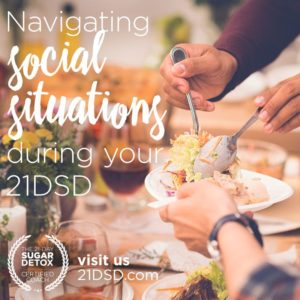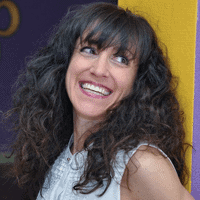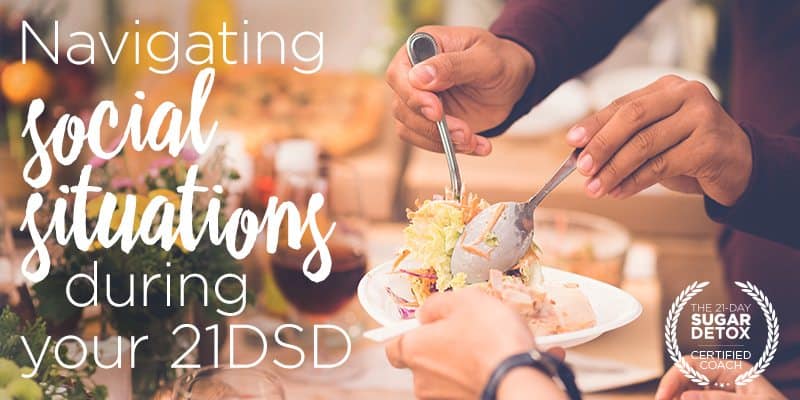Hey Folks! We're excited to welcome back Certified 21DSD Coach Michal Ofer. Michal's article is part of a series contributed by our Certified 21DSD Coaches. Enjoy! – Diane and Team
When you embark on a new way of eating, such as on your 21-Day Sugar Detox, you might feel overwhelmed with regards to your ability to live fully in your world and participate in social situation the way you are used to. You might feel concerned that your 21DSD will make your relationships more difficult and you will not be able to explain yourself clearly or know what to say to people.
I understand and can relate to all these concerns. I am always finding myself coaching and supporting people on how to resolve these issues and wanted to share a few tips and strategies for keeping your commitment to yourself and your 21DSD when those social situations come up. This will prove way more effective and result in a more fulfilling 21DSD experience rather than avoiding everyone for the duration of your program.
1. Prioritize YOU
You have to adopt the attitude of prioritizing yourself, your needs, and your goals. This means understanding that really, when you get down to it, no one cares what you choose eat or not to eat. It seems like nearly everyone these days is on some kind of special diet or food plan. Often one may feel that the social spotlight shines brighter on them than it actually does.
When you are following a 21DSD you might be worried that people are judging you for your food choices, but in reality, they probably hardly even notice. They are way too busy thinking about themselves, not about you. If they do comment, chances are it is out of idle curiosity rather than judgement and accusation.

2. Prepare
Prepare in advance what you will say when people ask questions or make comments. Potential responses can range from being wholly forthcoming and sharing the excitement of your 21DSD experience to the more conservative approach of talking about food sensitivities and explaining that sugar and flour don’t agree with you, so you are choosing to cut them out. You might go the medical route and cite some health concerns that may be alleviated by eliminating sugar and flour from your diet. You could also choose to not say anything at all and or say you are not hungry or do not feel like (insert food) right now. All of these are perfectly acceptable.
3. Own your 21DSD
Be proactive. You cannot expect to show up at an event or gathering involving food and assume that everything will take care of itself. You need to take actions like calling ahead and finding out what options are being served. Take a wedding for example: if you have a wedding reception to attend during your 21DSD, reach out to the bride or groom and ask for the name of the caterer so you can call and make sure you will have some food available that you are able to eat. If you know the couple well enough, you could even explain your situation to them and ask if there will be options for you. People are generally very understanding and happy to help. As far as the caterer is concerned, remember that part of their job is to accommodate food needs. You are not going to be an inconvenience.
In general, if you do discover a particular social situation may not offer the food options you need, bring your own meal or snacks or eat ahead of time. The lesson is, make sure you are prepared and never leave it to chance.
4. Social pressure can be perceived
Be very careful to not cave to perceived social pressure. Imagine you show up at a social event where a friend shows you a sugary treat and says she baked it just for you as she knew it was your favorite. This is a challenging situation but important to reframe it in this way: what if it were a peanut butter cookie and you were deathly allergic to peanuts? It would make no difference how hard she pushed or how much she begged you to eat it. You would be apologetic and convey how terrible you feel, but remain steadfast in your assertion that you are unable to eat it. Set your personal boundary in exactly the same way. Eating sugar and flour is an act of self-harm. Period. Establish a “no exceptions” rule.
If you have a really hard time with it because you feel like you are letting your friend down and if you feel extremely uncomfortable, you could use this moment as an opportunity to face your possible codependency issues and difficulty drawing boundaries. No momentary expectation should force you to harm yourself or forgo your health goals with food. Use your 21DSD as a time to finally learn how to say no. Open your heart to the personal growth opportunity in front of you.
5. Understand the process
Understand that changing your eating patterns long term, whether the 21DSD is your starting point or you are well on your way, will benefit you in the long run. It is a journey. At first, you might feel like your social world is constricting because going out to eat or joining gatherings with friends where you will be navigating tricky food situations can feel too challenging and difficult. I completely understand and sympathize as I have been there.
When I participated in my first 21DSD, I felt like my world narrowed. Social situations were unappealing because I was worried about my ability to resist food temptations, so I isolated myself a lot. As I completed a few more over the years (and my eating patterns when not following a 21DSD shifted to a whole foods plan), my world started opening up again. Today, I feel like I can eat out and travel anywhere while confidently navigating social situations involving food. Each and every past experience of eating with other people outside my home has grown into a subconscious database of automatic behaviors and responses that serve me really well. You will most likely experience a similar journey and I cannot stress enough that this is completely normal.
If you stick with it and put in the hard work of getting support during social situations, it will eventually become easy and automatic. It will stop depleting your willpower or taxing you emotionally. You will find yourself able to forget about it and enjoy yourself. In fact, as you begin to experience the benefits that the 21DSD brings, you might find that people want to know how you did it so they too can join.
Remind yourself often why you want to embark on this journey. It is not a chore or a punishment, but a gift you are giving yourself and your body. Take it on with gusto and enjoy the ride.
 Michal Ofer is a certified life coach, health coach and 21DSD coach.
Michal Ofer is a certified life coach, health coach and 21DSD coach.
She has always had a love for food, cooking and all things nutrition related. Michal grew up in South Africa where she studied biological sciences and got her degree in Optometry with a minor in holistic nutrition. After some traveling, disguised as learning overseas, Michal immigrated to Canada where she worked in business development and team building. A less than positive experience with the current acute care medical system and “Standard American (Canadian) Diet” whilst trying to overcome a chronic health issue led Michal on a path to discovering that food truly is our best medicine and that all healing begins in the gut. Once recovered, Michal wanted to help others reach their optimal level of health, wellness and vitality that a real food approach to diet gives. Michal is a nutritional consultant working with individuals looking to improve their general well-being, with a special emphasis on naturally and holistically healing the damage that disordered eating creates in the entire digestive system. When not counseling others or trying to keep up to date with the online world, Michal is an amateur cook, testing her newest food creations on brave volunteers. She can be reached at [email protected] for further insight into moving beyond eating disorders.

